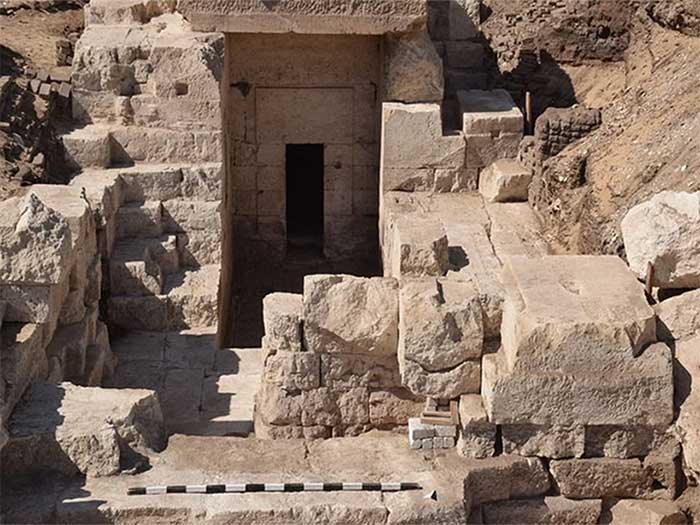Ruins of an ancient temple dating back to the Ptolemaic period discovered in Egypt
According to a reporter in Cairo, on November 23, an Egyptian and German archaeological delegation announced the discovery of an ancient temple dating back to the Ptolemaic period near the great temple of Aribis in Sohag province, southern Egypt.
This discovery marks an exciting addition to the rich archaeological sites of Sohag province.

Ruins of a Ptolemaic temple discovered in Sohag, Egypt. (Source: WAM).
Egyptian Supreme Council of Antiquities (SCA) Secretary General Mohamed Ismail Khaled highly appreciated the discovery, considering it a breakthrough in revealing the secrets of the previously unknown ancient temple in the Aribis area.
He said the front of the temple is 51m long with two towers, each 24m wide, surrounding a central gate.
Studies show that the tower was originally 18m high, equivalent in size to the iconic tower of Luxor temple.
According to archaeologists, the bell tower of the newly discovered ancient temple has hieroglyphics and intricate carvings depicting a Ptolemaic king receiving offerings from the lion-headed goddess Repit and her son, the god Kolanthes.
Carvings show the temple dates from the reign of King Ptolemy VIII with some inscriptions possibly referring to his wife: Queen Cleopatra III.
The head of the German archaeological mission, expert Christian Leitz, said archaeologists had also excavated a room south of the temple, which was partially discovered by British archaeologist Flinders Petrie in the early 20th century.
This room contains images of the celestial gods used to measure the hours of the night, along with carvings of the god Repit and the fertility god Min. They also recently discovered another room with a staircase.
Previously, the excavation team mapped the great temple of Aribis and recovered more than 30,000 ceramic pieces inscribed with Demotic, Coptic and Hieratic scripts.
Archaeologists said they will continue to excavate to discover the remaining secrets of this temple, while enriching Egypt's special archaeological record.
- Discovered the 3400-year-old temple of the ancient Egyptians
- Discovering vestiges of the temple dating back to 3,200 years in Egypt
- The 4,500-year-old Temple of the Sun that disappeared in Egypt was discovered
- Egypt discovered an ancient stone church of nearly 4,000 years old
- 2,000-year-old city trace in Egypt
- Repair sewer, dig ... whole mysterious temple 2,200 years old
- Discovering 1,000-year-old Cham Pa ruins
- Discover 4 ancient temples in Egypt
- Find ancient Pharaoh and god statues in Egypt
- Discovered ancient fortress more than 2,000 years old of Egypt
- Excavation of a bustling wooden statue dating back 4,000 years in Egypt
- Detecting the monk statue in rare marble
 Discovered an ancient centipede fossil 99 million years old
Discovered an ancient centipede fossil 99 million years old Discovered bat-like dinosaurs in China
Discovered bat-like dinosaurs in China Discovered a 200-year-old bronze cannon of the coast
Discovered a 200-year-old bronze cannon of the coast Discover 305 million-year-old spider fossils
Discover 305 million-year-old spider fossils